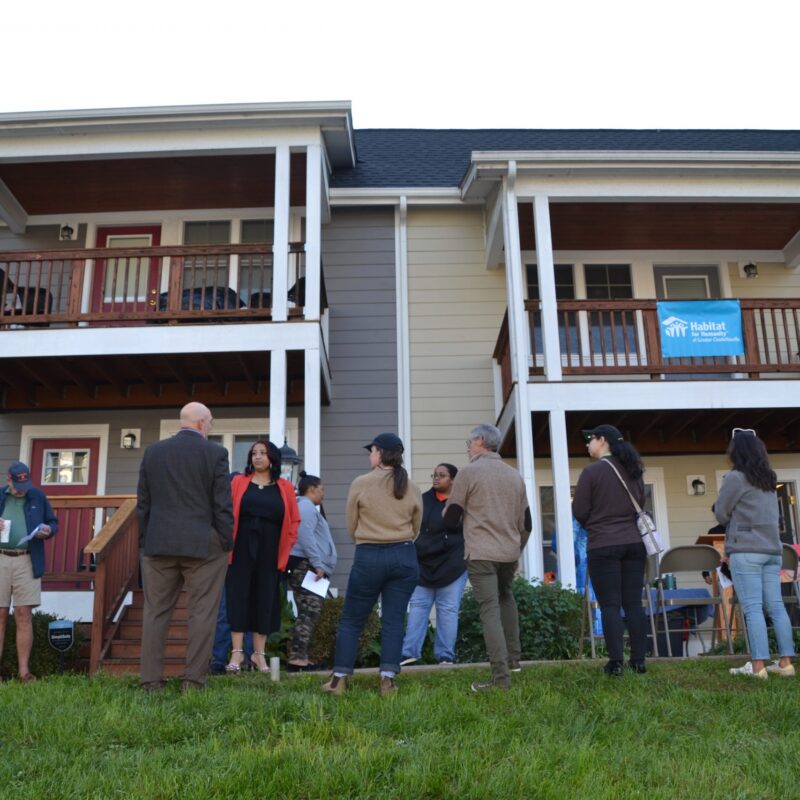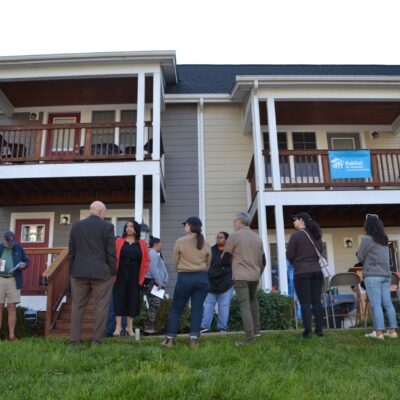By Scott Weaver and Will Goldsmith
On a day in 2003, Thomasine Wilson walked into Advance America on Madison Road in Orange with a checkbook from her newly opened account at SunTrust. Wilson had recently moved to Orange from Charlottesville when the rent on her one-bedroom apartment went up $400 a year. She’d found a place, smaller than she’d wanted, but by now she’d become used to making do. The line snaked forward, and Wilson fiddled with her new checkbook.
| Video of Thomasine Wilson at a protest against payday lending. |
Wilson learned of Advance America, a place to get a short-term loan, quick cash without a credit check, from a friend who got $10 off her next payday loan. Wilson had never heard about so-called payday lenders, but a loan outside the credit-score system sounded good—in fact, it was just what Wilson needed. Recently slapped with increases in rent and bills, and with a daughter of her own finishing high school, Wilson was also positioning herself to be a first-time homebuyer. For that, she needed good credit.
 Thomasine Wilson took out one payday loan in 2003. Two years and $2000 later, she pulled herself out of the cycle of debt that the loan touched off. |
| More features:
Advance America’s pocketbook Know the score Leading the lending fight Q: Why go to a payday lender? You call this reform? |
The line in front of Wilson finally wound down and she stepped up to the counter. She told the branch manager of Advance America that she needed a short-term loan of $200, and showed Washington her disability statement, proof of her income.
While the manager readied the paperwork, Wilson pulled out her new checkbook. She leaned over the counter and made out a check to Advance America for the amount of $230, dated exactly a month from that day.
The manager retrieved the receipt from the printer and handed it to Wilson. On the back were the loan’s specifics: a finance charge of $30 on a $200 advance, an annual percentage rate of 177 percent. In 30 days, Advance America would deposit Wilson’s check unless Wilson returned to pay it off. What began that day for Wilson as an emergency loan—a couple hundred extra to cover unexpected expenses, a last resort—would stretch into a cycle of debt that would ensnare Wilson for two years.
Payday loans have been a heated topic in Virginia since the industry gained access to the Commonwealth in 2002 thanks to legislation passed by the General Assembly. Proponents argue that payday loans are good options for working-class Virginians who just need a little extra money to get through a rough time. But Wilson argues otherwise—and offers herself as a living example of the rabbit hole of debt that can quickly open underneath you.
And so it began
Before Wilson moved to Orange, she was living in Charlottesville just off of Hydraulic Road, behind K-Mart. After spending almost 10 years in Washington, D.C., and working at Howard University, she moved back to the area where she had grown up. She was working as a correctional officer in the Fluvanna women’s prison, a job she loved.
“I had my life together,” says Wilson, a quick-talking woman whose words still bear a hint of Louisa drawl. She has a perpetual smile that by turns is warm, then rueful.
“Life was fine. I had two or three hundred dollars to just throw away, go shopping, get my hair done, do what I want to do. But then it got to the point that I couldn’t buy a soda cracker.”
While working at the prison, Wilson was injured and put on disability. With Charlottesville’s housing boom getting underway, she saw her rent double in 2001. The next year, she moved out to Orange County in search of affordable housing.
That’s when her bills exploded and life suddenly got shaky. By this time, Wilson had been on a tight budget, not hurting, but tracking every dollar, making sure there were no surprises at the end of the month. With the area still riding the housing boom, Wilson’s rent increased $200, and suddenly her fixed income was stretching thin. Wilson needed some help.
“At that time, I was trying to get myself to the point of being able to purchase a home,” she says. “I was trying to get clear with my credit, and [payday lenders] don’t check your credit. That’s the main reason I went. They were not going to pull my credit.”
“I thought going to get this [loan], it would help me through that emergency process. But at the same time, all of this shock came, and it was something I wasn’t expecting.”
 The payday lending reform bill is a “shell game,” says Alex Gulotta. “The General Assembly just doesn’t get it.” |
So with $200 in hand, Wilson walked out of Advance America, owing the lender $230 in exactly 30 days, and used the money to pay off rent and other bills. Thirty days later, Wilson returned to Advance America and paid off her loan in full—only to discover that, again, she was short on money. She hadn’t budgeted for the extra $30. And to cover that month’s shortage, she took out another $200 loan the same day she paid back the first, putting her further in the hole. She did this every month for two years.
While Wilson was being sucked into the spiral of debt that payday lending creates, her utility bills increased—the gas bill alone that had once been $25 a month jumped to nearly $60. Cable was the first thing to go. Wilson cut it off while she re-budgeted, trying to make one set of numbers match up with another. It was also at this point that Wilson’s mother, who had been living in a nursing home, died.
There was grief, but no extra bills, at least not immediately.
“I planned my mom’s funeral before she passed,” Wilson says. “So I had paid for it in advance. But then there are still extra things that come up. People don’t realize that after you paid for the final expenses, there are things to do after them.”
Wilson was struggling under the weight of debt even as $30 a month went to financing the Advance America loans. Inevitably, Wilson was coming up short every month. And every month, a new bill or debt demanded her immediate attention.
“Everything was right now,” she says. “It’s nothing that you could have budgeted for convenience. It’s right here and now, and you make a choice. And there was no choice. You take care of this. Take care of yourself later.”
The cycle was vicious
This is the implicit business model of payday lending: charge triple-figure APRs on small loans to people who are short on money. The financing charge often sets them far enough behind that they come to depend on a new loan each month.
Eventually, the borrower comes up short one too many months and needs some quick cash to pay back the payday loan. That’s when they go to another payday lender to take out a second loan to cover the first. And that’s what Wilson did.
In Charlottesville, Wilson took out a second loan for $300. She wrote a check, only the second one from her account, for $345 to Payday USA. Now Wilson was not only locked into paying $75 a month in finance charges on the two loans, she was constantly shuffling around money to do it. And every month, more money got lost in the shuffle.
While she was still paying each loan in full every month, she was falling further behind on her bills. She would take out $300 from Payday USA, and use $230 of that to pay off the first Advance America loan. Each month, on the same day she paid off the $200 loan—including the $30 finance charge—she took out another $200 to cover her monthly expenses.
Add to that moving expenses. Weighed down by bills and two payday loans, Wilson moved back to Charlottesville in search of a smaller place with cheaper rent. Once she was settled, she took a hard look at her financial situation.
“I starting counting things down and wondering why I’m a year in my new place and I’m worse off than if I had stayed in Orange and dealt with expensive rent,” says Wilson. “I started calculating. Where is all my money going? That’s when I figured out that they’re robbing me.”
Wilson’s two monthly loans hadn’t so much been propping her up as feeding off each other. She was continually borrowing money from one lender to pay the other one, and vice versa. Payday loans are supposed to be prorated if paid off early, but if Wilson came in to pay one of the loans before the 30th day, the employees would encourage her to wait and come back on the 30th day, so she could pay off the loan and take another one out in the same trip.
The lenders also push you to pay on the last day, says Wilson, because they’re betting that the more time the loan is out, the better the chance that you will have spent more money, and that puts you in a position where you’ll inevitably need more to cover regular expenses. If you walk in the door to pay off the loan, but paying off the loan puts you in a position where you need money for other necessities, then it’s easier to convince you to take out another loan.
There is also the pressure to take out more than you need. If you go in for a $200 loan like Wilson did, chances are good that the man or woman behind the counter will tell you that you can borrow much more than that.
To see what the payday loan process is like, City Councilor Holly Edwards borrowed from a local lender. Though Wilson typically received cash when she got a loan, Edwards was given a check for $300 that cost her $5 to cash.
“Not having that $5 might not be a big deal to some people,” says Edwards, “but if you need the money to pay your rent and pay your bills, then that $5 makes a big difference.
Thinking that the lenders would simply cash her check, she didn’t think there was any reason to return—until she got a call after her loan was due. “When I went in, they sounded like payday lenders, but when they called, they sounded like bill collectors,” says Edwards. Why don’t they just cash the check in such circumstances? Probably because by doing so, it would cut off another opportunity to sell you on a new payday loan.
The caller lured Edwards back to the store by claiming that she signed an agreement that said she had to return. When Edwards returned, the clerk admitted that the demand that she physically appear at the store wasn’t in writing. After Edwards paid off her loan in cash and received her check, the clerk gave her a coupon for $10 off her next loan for every referral. A few weeks later, she got a call asking if she needed another loan herself.
While not explicitly endorsing these practices, Advance America’s 2007 annual financial report suggests that employees have incentives to push people like Wilson into a loan cycle: “The three metrics we reward are: (1) maintaining a high level of compliance with applicable laws and regulations; (2) meeting stated growth objectives; and (3) meeting collection targets.” That is, one metric to satisfy investors’ conscience, two metrics to satisfy their wallets.
Nothing is illegal about discouraging payday customers from paying early or encouraging them to take out more money. “We train our employees to adhere to state law,” says Jamie Fulmer, spokesperson for Advance America, based in Spartanburg, South Carolina.
Edwards is particularly galled by payday lending commercials that show people getting payday loans for a vacation or for a child’s birthday party, though she notes that the ads seem to have gotten better. Those available on Advance America’s website show a hardworking bus driver with a narrator talking about how she “advances America.”
“We’re not in business to encourage people to take out a loan they can’t afford to take out,” says Fulmer. “It makes no sense for any lender to loan somebody money that they think can’t be repaid.”
How the tables were turned
Fulmer points out that 97 percent of Advance America customers repay their loans. And for two years, Wilson was one of those customers—until finally, in 2006, she realized what was happening. She was locked in a cycle of predatory lending. And so she resolved to get herself out.
In December, she walked into the Charlottesville branch of Advance America, the lender from which she’d been borrowing $200 a month for more than two years. She was there on the 29th day, one day short of the loan’s due date.
When she went to pay, the lady behind the counter said, “Well, don’t pay us today. You come back tomorrow and we’ll be happy to give you money back.”
“No, ma’am,” said Wilson. “You take my money today.” She pushed $230 in cash across the counter to her. “I’m going to tell everybody I know not to come here. I’m going to tell every single soul I meet on the street that this is a terrible service, how you cheat people, how you trick them into something that is not going to be beneficial to them down the road.”
The same day, Wilson went to Payday USA, where she’d been borrowing $300 monthly.
“I’m going to make payments to you until I pay this off,” she told the Payday USA employee, handing her half of the $345 she owed.
“Are you on a payment plan?” asked the employee.
“I am today,” said Wilson. “And I’m going to tell everybody I know, don’t come down here.”
Taking it to the General Assembly
Wilson was true to her word.
During the past legislative session, Wilson, who after caring for the elderly since 1996 has started a new career, has traveled to Richmond numerous times to speak to legislators about payday lending. She also spoke at the General Assembly.
“It was truly frightening,” Wilson says about standing in front of delegates and senators decked out in dark suits. “It was the first time I went, and it was a little scary. But after that, you get used to seeing their faces, and they get used to seeing you.”
Wilson was faced with the task—daunting at times—of explaining payday lending to a group of people who, by and large, have never had any experience with the industry. Skepticism abounded. Some lawmakers were completely unaware of the practice.
“People were like, ‘What is it? Nobody told you to go in there and borrow money,’” says Wilson. “They really didn’t know what it was.”
Well-heeled legislators’ ignorance of payday lending doesn’t necessarily point to General Assembly cluelessness. Instead, it attests to the economic and racial divides that payday lending highlights. It is no secret that the great majority of payday lending businesses can be found in or near lower-income neighborhoods. Charlottesville is no different, with locations on Carlton Avenue, Cherry Avenue, Emmet Street, Pantops and 29N. In the past, lenders have come under heavy fire for setting up shop around military bases, such as in Virginia Beach.
Payday lenders market their product to people with bad credit, little to no savings and no financial security. Wilson likens them to a predator stalking a certain kind of people, ensnaring them into a cycle of debt that necessitates one loan after the next. And that certain kind of person isn’t one with the ability to charge an emergency expense to a credit card, go to family or friends for a small loan or draw from savings.
“If you got somebody making $24,000 a week, they’re not going to come over here,” says Wilson.
While she was in Richmond, working to convince the General Assembly to put in place restrictions on payday lending, a legislator approached her.
“Why would people go there?” he asked, bewildered at the fact that so many people enter in to a financial transaction that is so blatantly bad for the borrower.
“It all depends,” answered Wilson. “Are you living off of new money or old money?”
Legislators who supported the payday loan industry “haven’t experienced it,” says Wilson. “They haven’t been to them for anything, so they really don’t know how it works. They’re not on budgeted incomes.”
Thanks in large part to people like Wilson, the General Assembly has looked at legislation for years that would scale back payday lending rates. A popular rallying rate has been 36 percent annually, a number that lenders have argued is too low for them to operate.
But never underestimate legislators’ ability to muck things up, particularly when Advance America alone has given almost $170,000 to Virginia officials and committees since 2000 (58 percent of it, by the way, went to Democrats). This session, House Bill 12 started with a simple 36 percent cap, which would have meant about $1.50 for a two-week loan of $100. But after the bill went through the Richmond sausage factory to pass the House and Senate, it came out with more than enough extra fees to make up the difference. Rather than lowering the amounts that borrowers pay, it actually raises them through an additional “loan fee” and “verification fee.” Someone borrowing $100 for a month can now be charged $28 instead of $15. Someone borrowing $500 can now be charged $115 instead of $75.
What the bill does do is limit payday loans to five in a 180-day period, though that limit is high enough to accommodate the eight payday loan average that a Virginia borrower takes out a year. Perhaps its only meaningful reform will be a database to track those loans in order to keep borrowers like Wilson from having several payday loans out simultaneously and a 24-hour cooling off period between paying off loans and taking out new ones, which will force lenders to alter the tactics used on Wilson to get her to immediately take out a new loan.
Nobody is particularly happy about the legislation. The Virginia Organizing Project, which helped lead the 36 rate cap campaign, is urging Kaine to alter the new legislation. “Lowering the interest to 36 percent and implementing other fees that drive up the cost way beyond what it currently is make [a] mockery of all the effort that has gone into reducing the predatory aspects of payday loans,” says Pete Purdue of the Virginia Organizing Project in a letter to Governor Tim Kaine.
“It’s horrible,” says Alex Gulotta, executive director of the Legal Aid Justice Center. “To even call it payday lending reform does an injustice to the word ‘reform.’
“The General Assembly just doesn’t get it. Lots of people think they need crack cocaine. Lost of people want crack cocaine. That doesn’t change the fact that we make crack cocaine illegal. It’s bad. Doesn’t matter how many people want it. It doesn’t matter how many people make a living selling it. It’s just bad for society, and it should be outlawed.”
Even Advance America isn’t a fan of the legislation. “Part of what we don’t like about the bill that’s passed the General Assembly is that it changes the nature of the payday product,” says Fulmer. “Consumers like the payday product as it is because it’s simple and it’s straightforward and it’s upfront. They know that they can come into our centers, they can get $100, pay $15 and have that money for a period of two weeks. It keeps them from accruing large credit card balances or reaping additional fees that carry negative credit consequences.”
If real payday lending reform is going to take place in Virginia, it will require more than just Wilson stepping forward. But though there are plenty of people with stories like hers to tell, many of them are too ashamed to speak out.
“I know people who owe thousands of dollars,” says Wilson, “but they don’t want to show up and say they have problems.” According to her, many people who have taken out loans are loathe to go to lenders close to where they live. Charlottesville residents might go to outlying counties where there is less of a chance they might be recognized in line.
“[Legislators] need the examples that show people that this is an unhealthy practice that should be outlawed,” says Gulotta. “All that we can do is document the abuses, because [lenders] will continue to go to the edge, if not past the edge, of what the law allows in terms of the language and the spirit.”
Wilson tries to tell other people who have been caught up in “this system” that instead of being ashamed of the fact, to speak out against it. Many people, though, won’t admit that they even know what a payday loan is.
“‘Payday? What is that?’” Wilson asks in mock shock, channeling the voice of someone pretending to be unaware.
“Don’t give me that,” says Wilson. “I saw you standing in line with me!”





